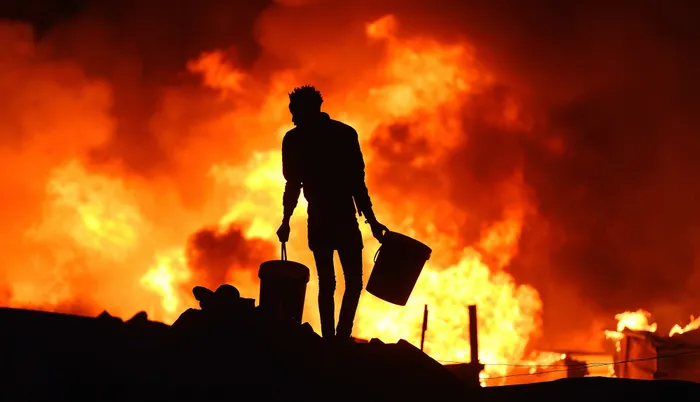How alcohol consumption correlates with fire incidents in Cape Town

New research from Stellenbosch University (SU) shows that there is a strong correlation between alcohol consumption and residential fire incidents.
Image: Phando Jikelo/ Independent Newspapers
New research from Stellenbosch University (SU) shows that there is a correlation between alcohol consumption and residential fire incidents.
The study, published in the International Journal of Fire Science and Engineering, compared fire incident data from 2020 with a five-year average (2015–2019).
The researchers, Dr Natalia Flores Quiroz and Professor Richard Walls of Stellenbosch University's fire engineering team, focused on formal and informal residential fires in Cape Town, and compared results to trends in cities around the world.
This site was chosen due to the high quality and availability of the City of Cape Town's long-term fire incident data. The City's extreme socioeconomic disparities also made it an appropriate setting to examine differences between formal and informal settlements.
During the first alcohol ban in April 2020, the number of residential fires in Cape Town dropped by 32% compared to the previous five-year average. Informal settlements saw a 28% drop, while formal areas experienced a 37% decrease, the authors stated.
While alcohol consumption is not a direct cause of fires, it can create “dangerous situations that could lead to an increase in fire risk." It impairs judgement, increases risky behaviour, and reduces reaction time in emergencies.
Dr Flores-Quiroz said: “We are not encouraging the banning of alcohol again. However, this data does give us one of the first quantitative correlations between alcohol consumption and fire incidents on a large scale anywhere in the world."
The study further highlighted that informal settlements were more affected by the alcohol bans than formal ones. This may be due to a host of factors, including the inability of residents in informal areas to stockpile alcohol during restrictions, unlike individuals in formal housing who had greater access and budgetary means.
The findings were compared with international data from New York, London, Tokyo, and San Francisco, which imposed stay-at-home measures but did not restrict alcohol sales.
One of the most insightful aspects of the research was the distinction between formal and informal settlements.
While both saw fewer fires during the initial ban, the study found that only informal areas consistently experienced reductions during subsequent bans. For example, in July and August 2020 (during the second ban), informal fire incidents were down 10% and 20% respectively, compared to average figures. In formal settlements, no significant reduction occurred after April.
“Firefighters, social workers, and communities have often highlighted the link between alcohol consumption and home losses to fire. We now have more insight into how large that linkage may be," said Dr Flores-Quiroz.
The City of Cape Town stated that their statistics show that most fatalities occur overnight, between 9pm and 6am, on weekends, and that the majority of victims are men.
“These trends point to the ongoing challenge around alcohol and other substances. Handling flammable items requires vigilance and care – something that is far more difficult to do when intoxicated.
“In times like these, steer clear of open flames, for your own safety and that of those around you,' said JP Smith, mayoral committee member for safety and security.
Residents are encouraged to save the Public Emergency Communication Centre's number on their cellphone, in case of emergency: 021 480 7700.